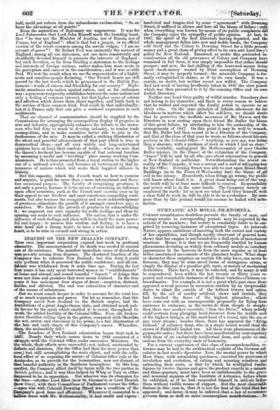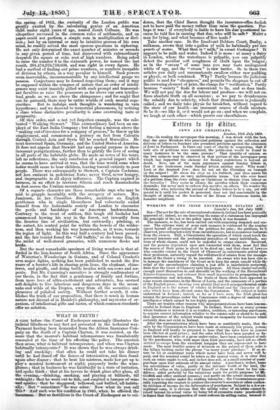GYMNASTIC AND MORAL PILZENOMENA.
COMMON resemblances doubtless pervade the family of man, and average results in corresponding periods may be expected in the actions of its members ; but society is constantly liable to be sur- prised by recurring instances of exceptional types. At intervals Nature appears ambitious of asserting both the extent and variety of her capabilities, and though mostly observant of general laws, shows that her empire is not bounded to a dull cycle of monotonous creations. Hence it is that we are frequently startled by human phrenomena deviating as widely from ordinary models as cemetery appearances in the heavens do from the more regular or at least better ascertained movements of the planetary bodies. What or character these surprises on routine life may have, can never foreseen; they may be some novel forms of outrageous crime, or simply the display of a peculiar gift, taste, or merely of mechanical dexterities. There have, it may be collected, and by many it will be remembered, been within the last twenty or thirty years re- peated and remarkable instances of all these varieties of human ex- traordinaries. For example, it is not a great while past since there appeared several persons in succession smitten by an irrepressible desire to climb the outside of the loftiest towers and spires, till, by the aid of sundry artificial claws and dentals, they had reached the fanes of the highest pinnacles ; others have come out with an unconquerable propensity for flying from eminence to eminence, as the crows do from steeple to steeple ; then there was another eccentric, "Sam the Diver,' whom nobody could restrain from plunging head-foremost from the middle are of the highest bridges, or the mast-head of a vessel, into the sea or any river stream ; besides these, there has appeared the ".flyiug Ireland," of saltatory fame, who at a single bound would clear the crown of Pickforcl's loaded van. All these were phenomena of the gymnastic order ; but there have been manifestations contemporary with them of an exclusively intellectual form, and quite as an- melons from the everyday casts of humanity.
For a current expression of this class of incomprehensibles, re- ference may be had to the arithmetical exploits of the German cal- culator in last week's Spectator. Now, the mental power by which Herr Daze, with astonishing quickness, executed his processes of involution and evolution, of cubing and squaring numbers and extracting their roots, or that by which he multiplied twelve figures by twelve figures and gave the product exactly in a minute and three-quarters, must have been as unfathomable to the grave and. reverend signiors of the Institute of Actuaries, before whom he exhibited, as if he had suspended himself in mid-air before them without visible means of support. But the most observable feature in this case is, that it is not the first of the kind that lists appeared ; and hence it may be inferred that a law of recurrence governs them as well as more commonplace manifestations. In , the spring of 1812, the curiosity of the London public was greatly excited by the calculating genius of an American child under eight years of age, named Zerah Colburn. He was altogether unversed in the common rules of arithmetic, and on paper could not perform a simple sum in multiplication or divi- sion; but by ail internal or may be intuitive process of his own mind, he readily solved the most operose questions in cipheri He not only determined the exact number of minutes or eecon in any given period of time, but discovered with extraordi
despatch the square or cube root of high numbers. Being
to raise the number 8 to the sixteenth power, he named the last result, 281,474,976,710,656, and was right in every figure. He had a method of finding out prime numbers' or numbers incapable of division by others, ina way peculiar to himself. Such powers seem inscrutable, incommensurable by any intellectual gauge we possess. Conjectures may be formed respecting them; and it may be supposed within the compass of nature that an order of intelli- gences may exist innately gifted with such prompt and transcend- ent faculties as raise the possessors as far above our own intellec- tual grade as we are above the chimpanzee ; and for aught that cam be gainsaid, there may be entire worlds of such mental supe- riarities. But to indulge such thoughts is wandering in vain hypotheses; and we descend to terrestrial phenomena, by noticing a class whose distinctive peculiarity is some overruling taste or propensity. Of this order., and m not yet forgotten example was the cele- brateda Walking Stewart." This extraordinary had been an em- ploye of the F_.asit India Company ; but feeling a mission above the "making out of invoices for a company of grown," he threw 'aphis employment, and commenced a journey on foot from Calcutta through Central Asia and Syria till he reached Marseilles. He next traversed Spain, ,Germany, and the United States of America. It does not appear that Stewart had any special purpose in these incessant peregrinations, further than to gratify the love of seeing in all parts of the habitable globe. He made no notes of his tours, left no reflections; the only conclusion of a general import which he seems to have arrived at was, that the time would some when ladies-would cease to bear children, leaving travail entirely to poor people. There was subsequently to Stewart, a Captain Cochrane, not less eminent in, pedestrian" feats; never tired, never hun and impregnable to all skyey influences. The Captain expired harness, in an effort to traverse Siberia and reach Kamtschatka on foot across the Uralian mountains.
Of a cognate character are those remarkable nagn who may be said to grapple insatiably, with the savagery, of nature. Mrs. Jamieeon, ha her Canadian Rambles, *tuitions an English gentleman who in single blessedness had voluntarily exiled himself from the fashionable society of London to encounter the perils and inirdships of an American backwoodsman. Contrary to the wont of settlers, this tough old baehelor had commenced hewing his way in the forest, not inwardly from the frontier line of civilization, but outwardly ; pitching at the outset, his central point far within the bowels of the wilder- ness, and then working his way homewards, as it were towards the region of light. In this way half a century had been passed; and the fair tourist found the "old buffalo," as she terms him, in the midst of well-stored granaries, with numerous flocks and herds.
But the most remarkable specimen of living wonders is that af- farded in the lion-hunter of South Africa. Since the appearance of Waterton's Wanderings in. Guiana, and of Colonel CrockeVs mum major fights, nothing has been published to match the five years of a hunter's life in chasing grim lions, the elephant, rhino- pesos, and giraffe, and doing battle besides with sea-cows and ser- pents. But Mr. Cumming's narrative is strongly confirmatory of our thesis, in the fact that a gentleman of family and fortune, from mere love of ultra-excitement and adventure, has scorned soft delights to live laborious and dangerous days in the savan- nahs and wilds of the Tropics, away from all the securities and pleasures of polished society. Without further search, it esta- blishes the truth of our proposition, that there is much in human nature not dreamt of in Hamlet's philosophy, and mysteries of or- ganism, of intellectual gifts and tastes, of which common standards offer no solution.



























 Previous page
Previous page